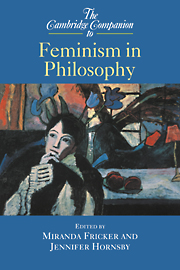Book contents
- Frontmatter
- Introduction
- 1 Feminism in ancient philosophy
- 2 Feminism in philosophy of mind
- 3 Feminism in philosophy of mind
- 4 Feminism and psychoanalysis
- 5 Feminism in philosophy of language
- 6 Feminism in metaphysics
- 7 Feminism in epistemology
- 8 Feminism in epistemology
- 9 Feminism in philosophy of science
- 10 Feminism in political philosophy
- 11 Feminism in ethics
- 12 Feminism in ethics
- 13 Feminism in history of philosophy
- Further reading
- Index
5 - Feminism in philosophy of language
Communicative speech acts
Published online by Cambridge University Press: 28 May 2006
- Frontmatter
- Introduction
- 1 Feminism in ancient philosophy
- 2 Feminism in philosophy of mind
- 3 Feminism in philosophy of mind
- 4 Feminism and psychoanalysis
- 5 Feminism in philosophy of language
- 6 Feminism in metaphysics
- 7 Feminism in epistemology
- 8 Feminism in epistemology
- 9 Feminism in philosophy of science
- 10 Feminism in political philosophy
- 11 Feminism in ethics
- 12 Feminism in ethics
- 13 Feminism in history of philosophy
- Further reading
- Index
Summary
Some philosophical work about language and its use has been inspired by feminist agenda, some by malestream philosophical agenda. Reading work in these two areas - in feminist-philosophy of language and in philosophy of language, as I shall call them - one easily gets the impression that they are totally separate enterprises. Here I hope to show that the impression is partly due to habits of thought that pervade much analytical philosophy and have done damage in philosophy of language. My claim will be that an idea of communicative speech acts belongs in philosophy of language (section 2). I think that the absence of such an idea from malestream accounts of linguistic meaning might be explained by ways of thinking which are arguably characteristically masculine (section 3). Once communicative speech acts are in place, various feminist (and other political) themes can be explored (section 4).
Feminist-philosophy of language and philosophy of language
Language's relation to gender was at the centre of discussions from the beginning of feminism's second wave. Dale Spender, in a path-breaking book, claimed that 'males, as the dominant group, have produced language, thought and reality'.3 Some feminists refused to share Spender's pessimism, and questioned whether language could be the powerful controlling influence that Spender represented.4 But a view of language as a vehicle for the perpetuation of women's subordination was prevalent in the 1980s, even if it was often based upon less radical claims than Spender's. Writers gave attention to the sexism implicit in language that contains purportedly generic uses of masculine terms, especially the supposedly neutral 'man' and male pronouns.
- Type
- Chapter
- Information
- The Cambridge Companion to Feminism in Philosophy , pp. 87 - 106Publisher: Cambridge University PressPrint publication year: 2000
- 35
- Cited by



